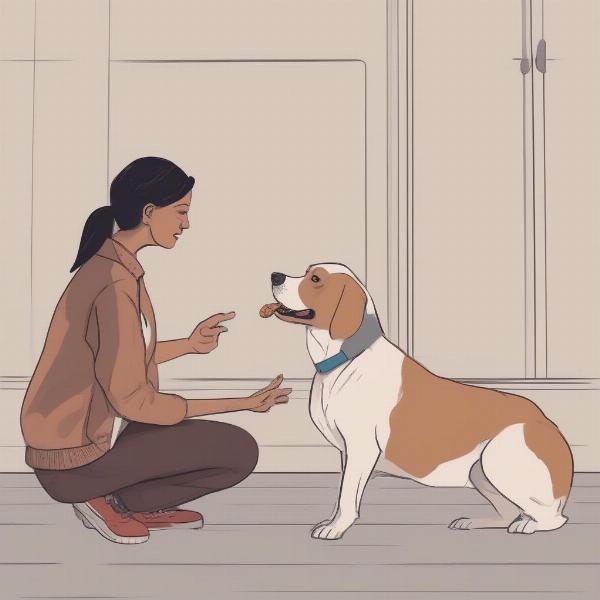The term “dog amateur” often refers to someone new to the world of dog ownership. Being a dog amateur isn’t something to be ashamed of; it’s a starting point, a journey of learning and growth alongside a furry companion. This guide is designed to help dog amateurs navigate the exciting, and sometimes challenging, world of dog ownership, providing practical advice and reliable information for every step of the way.
Choosing the right breed for your lifestyle is paramount. Consider your living space, activity level, and personal preferences. A high-energy breed like a Border Collie may not be suitable for apartment living, while a low-key breed like a French Bulldog might thrive in a smaller space. Researching breed temperaments, health predispositions, and grooming needs is essential for a successful match.
Choosing Your First Canine Companion
As a dog amateur, the first big decision is which breed to bring home. This can feel overwhelming with so many amazing options. Think about your lifestyle: Do you live in a bustling city or a quiet countryside? Are you an active person who enjoys hiking and running, or do you prefer cozy evenings at home? Your lifestyle should heavily influence your breed choice.
What are your expectations for your future dog? Do you envision a cuddly lap dog or an energetic playmate? Consider the amount of time you can dedicate to training, grooming, and exercising your dog. Each breed has unique characteristics, and finding a breed that aligns with your lifestyle and expectations is crucial for a harmonious relationship.
Essential Dog Care for Amateurs
Caring for a dog involves much more than just providing food and water. It’s about building a strong bond based on trust, understanding, and consistent care. Regular veterinary check-ups are essential for maintaining your dog’s health. Vaccinations, parasite prevention, and dental care are vital components of responsible dog ownership.
Nutrition plays a significant role in your dog’s overall well-being. Choose a high-quality dog food appropriate for your dog’s age, breed, and activity level. Consult your veterinarian for personalized dietary recommendations.
Mastering Basic Dog Training
Training is an ongoing process that strengthens the bond between you and your dog. Start with basic obedience commands like sit, stay, and come. Positive reinforcement methods, such as rewarding desired behaviors with treats and praise, are highly effective. Consistency and patience are key to successful training.
Socialization is another crucial aspect of dog training. Expose your dog to various sights, sounds, and experiences from a young age. This helps them develop into well-adjusted, confident adults.
“Early socialization is crucial for preventing behavioral issues later in life,” says renowned dog trainer, Sarah Miller, CPDT-KA. “Introducing your puppy to different environments and people helps them become well-rounded and adaptable.”
 Effective Dog Training Techniques for Beginners
Effective Dog Training Techniques for Beginners
Conclusion
Being a dog amateur is the first step in an incredible journey of companionship. By understanding the responsibilities of dog ownership and embracing the learning process, you can build a strong and fulfilling relationship with your furry friend. Remember to research thoroughly, seek professional advice when needed, and most importantly, enjoy the special bond you share with your canine companion.
FAQ
- How do I choose the right dog breed? Consider your lifestyle, living situation, and experience level. Research different breeds to find one that matches your needs.
- What are the essential supplies for a new dog? Food and water bowls, a collar and leash, a comfortable bed, grooming tools, and toys are essential.
- How often should I take my dog to the vet? Annual check-ups are recommended, along with vaccinations and parasite prevention as advised by your vet.
- What is the best way to train a dog? Positive reinforcement methods, using rewards and praise, are generally the most effective.
- How do I socialize my dog? Expose your dog to different people, animals, and environments from a young age, in a safe and controlled manner.
- What should I feed my dog? Choose a high-quality dog food formulated for your dog’s age, breed, and activity level. Consult your veterinarian for specific recommendations.
- How much exercise does my dog need? Exercise needs vary by breed and age, but all dogs need regular physical activity.
About ILM Dog
ILM Dog is your trusted international resource for all things dog-related. We provide expert advice on dog breeds, health, training, nutrition, grooming, and much more. We are dedicated to helping dog owners, from amateurs to experts, provide the best possible care for their canine companions. For personalized guidance and support, contact us at [email protected] or call us at +44 20-3965-8624. We’re here to help you every step of the way!